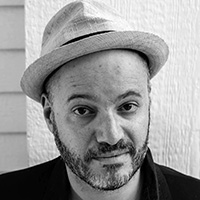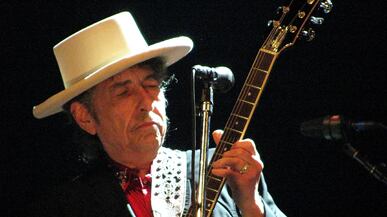“I’ve been in trouble ever since I set my suitcase down,” sang Bob Dylan, on “Mississippi,” a song released 10 years ago on “Love and Theft.” He was not kidding. Dylan, who will be turning 70 on May 24, put his suitcase down in New York City half a century ago and has been in trouble ever since. Elvis once sang that his name was trouble. For Dylan, it has been his entire being. As he put it in “Trouble,” a hypnotic blues from 30 years ago:
Trouble in the city, trouble in the farm You got your rabbit’s foot, you got your good-luck charm But they can’t help you none when there’s trouble

From his invented name and fabricated identity to the recent furor over his performances in China, it is unlikely the Artist Formerly Known as Zimmerman will grow soft in his golden years. There was something prophetic when, on a placard for the Subterranean Homesick Blues promo, he scrawled, as if crying for help, “suck-sess.”
When he wrote “Blowin’ in the Wind” in ten minutes, he not only composed a civil rights anthem that soared from the March on Washington to Obama’s election, he was also accused of plagiarizing it. When he won an award from the Emergency Civil Liberties Union shortly after the JFK assassination, he drunkenly told the crowd he identified with Lee Harvey Oswald. Even as he was making enemies, though, he was also gaining an obsessive following. Some of them were folknik furies, philistines masquerading as bohemians, who never forgave him for playing rock and roll in 1965 and 1966 and booed every plugged in performance he gave.
All along the way, he wrote songs that would last forever. “Mr. Tambourine Man” was an eternal plea for the sublime. “Like a Rolling Stone” was the put down you wished you could deliver. And break up songs? “It’s All Over Now, Baby Blue,” “Just Like a Woman,” and “Idiot Wind” leave a sting just thinking about them.
But his personae kept evolving, infuriating listeners who wanted him to be the model from three years earlier. And so he was branded “Judas!” by a heckler in a Manchester concert in 1966 for not being his incarnation from 1963. In 1969, crooning “Lay Lady Lay” in a countrified baritone and dueting with Johnny Cash upset the counterculturati who were belatedly ready to embrace his rock and roll from 1966. Finally, when he returned to the road with The Band in 1974, the eternal praise seemed to make him howl with fury. After the collapse of his marriage (and the ultimate divorce album that is Blood on the Tracks) his troubles seemed only internal; his audience was satiated.
No one since Garbo has been so deft at ducking fans, especially most of the writers and critics prophesizing with their pens.
That all changed, of course, in 1979, when he found Jesus, proselytized from the stage, and refused to perform any of his older material. The boos came back and it was, ironically, “Judas!” all over again. Eventually, Dylan brought his songbook back, and while this was greeted as a major event by his fans, the culture seemed to move on; as good as Infidels was in 1983, it was drowned out by Michael Jackson. In the 80s Dylan could still write great songs (“Every Grain of Sand,” “Blind Willie McTell,” “Brownsville Girl.” “Dignity,” among others), but only diehards and music critics were paying attention. By the time he turned 50, and he became less coherent, it seemed like it was only downhill from there.
Except that it wasn’t. Dylan was afflicted not by boos but a nearly fatal heart infection that generated near obituaries on the covers of all the New York tabloids. Suddenly everyone wanted him back, and he had an album, Time Out of Mind, that was everything anyone could have dreamed of as he was pushing 60 and perfecting a late style. In the past decade, Dylan has been decorated with every conceivable award: Grammys, an Oscar (which he takes with him onstage), a Golden Globe, a Pulitzer, a Kennedy Center honor. He became the oldest person to have a #1 album at 65, then broke his own record with another #1 at 68. He serenaded both Clinton and Obama, and it seemed like the boos could finally stop. Murmurs of plagiarism didn’t seem to do much damage. “Fame and honor never seem to fade,” he sang in 2006. Or could they? After it was reported that Dylan allowed the Chinese government to vet his song list, Maureen Dowd in the New York Times was shocked, shocked, calling him a sell-out as if it was for the first time. Could it be that the entertainer had finally eclipsed the artist?

In response, Dylan did something that he hadn’t done since the Lee Harvey Oswald snafu of ’63: he wrote a public statement. It turned out that everything reported about the Chinese shows was wrong, from the set lists to the turnout. No one since Garbo has been so deft at ducking fans, especially most of the writers and critics prophesizing with their pens. Yet the Dylan of this statement, just from a few weeks ago, could give a clue about what a gentler Dylan could be past threescore years and ten:
Everybody knows by now that there's a gazillion books on me either out or coming out in the near future. So I'm encouraging anybody who's ever met me, heard me or even seen me, to get in on the action and scribble their own book. You never know, somebody might have a great book in them.
That sounds like a grand idea. Happy 70th, Bob, and may you stay forever young.
Plus: Check out Book Beast for more news on hot titles and authors and excerpts from the latest books.
David Yaffe is a professor of English at Syracuse University. His latest book, Bob Dylan: Like a Complete Unknown, is just out.






